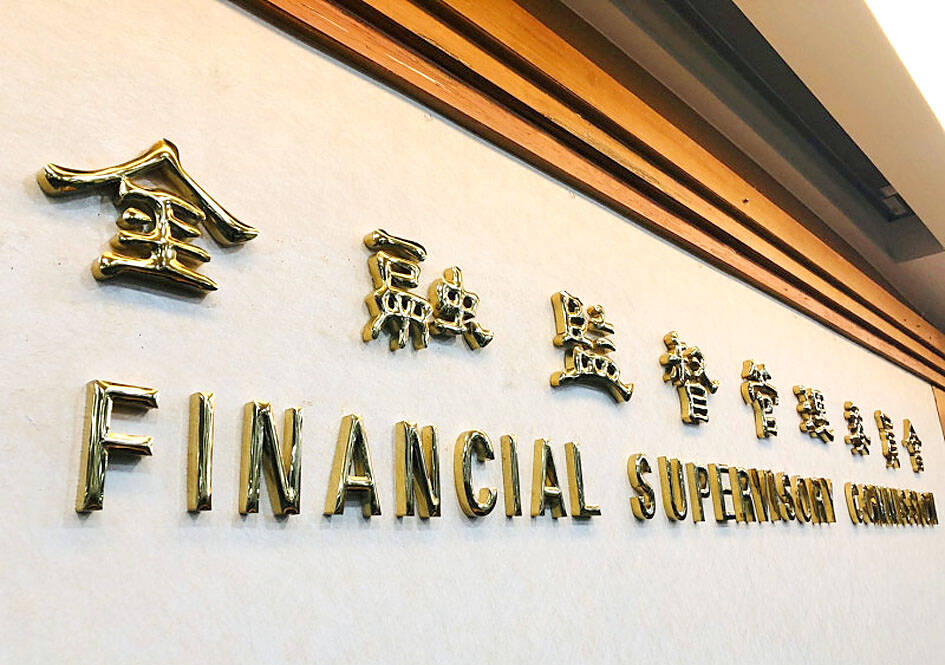The Financial Supervisory Commission (FSC) fined financial institutions and publicly listed firms NT$129.02 million (US$4.03 million) during the first eight months of this year for internal control, financial services misconduct and corporate governance-related breaches, data released last week by the commission showed.
The fines were down 30.42 percent from the NT$184.42 million imposed during the same period last year and were less than half — 46.97 percent — of the commission’s target of NT$274.68 million for the whole of this year, the commission said.
The commission attributed the decline in fines to a higher comparison base last year, when it meted out heavy penalties to a financial holding company for corporate governance breaches after a major shareholder was found to have improperly interfered in the company’s operations, as well as to several banks for employee involvement in assisting fraud rings or theft from clients.

Photo: Kelson Wang, Taipei Times
Among the commission’s three major subordinate agencies, the Banking Bureau and the Insurance Bureau imposed a lower total amount of fines in the first eight months of this year compared with the same period last year, while the Securities and Futures Bureau imposed slightly more.
In the January-to-August period, the financial penalties imposed by the Banking Bureau were NT$39.72 million, down 52.09 percent from a year earlier. The largest fine was NT$12 million imposed on Taichung Commercial Bank Co (台中商銀), with fines of NT$8 million respectively imposed on Shin Kong Commercial Bank (新光銀行) and Cathay United Bank (國泰世華銀行).
The Insurance Bureau imposed total fines of NT$36 million during the eight-month period, down 27.13 percent year-on-year. The largest fine was NT$9 million imposed on the Taiwan branch of Cardif Assurance Vie (法國巴黎人壽), followed by a NT$6 million fine imposed on the Taiwan branch of Cardif Assurance Risques Divers (法國巴黎產物保險).
Both are subsidiaries of the same France-based international insurance company.
During the same period, the Securities and Futures Bureau fined several securities and futures firms, including Time Securities Investment Consulting Co (時間投顧) and Cathay Securities Investment Trust Co (國泰投信), for a total of NT$53.3 million, up 0.34 percent year-on-year.
The commission’s budget documents show that it has set target penalties of NT$263.37 billion for next year, down about 4.12 percent from this year’s target and the lowest in the past four years.
The commission said that it views these fines as a way to help firms correct their deficiencies, not as a means of generating income.

NEW IDENTITY: Known for its software, India has expanded into hardware, with its semiconductor industry growing from US$38bn in 2023 to US$45bn to US$50bn India on Saturday inaugurated its first semiconductor assembly and test facility, a milestone in the government’s push to reduce dependence on foreign chipmakers and stake a claim in a sector dominated by China. Indian Prime Minister Narendra Modi opened US firm Micron Technology Inc’s semiconductor assembly, test and packaging unit in his home state of Gujarat, hailing the “dawn of a new era” for India’s technology ambitions. “When young Indians look back in the future, they will see this decade as the turning point in our tech future,” Modi told the event, which was broadcast on his YouTube channel. The plant would convert

‘SEISMIC SHIFT’: The researcher forecast there would be about 1.1 billion mobile shipments this year, down from 1.26 billion the prior year and erasing years of gains The global smartphone market is expected to contract 12.9 percent this year due to the unprecedented memorychip shortage, marking “a crisis like no other,” researcher International Data Corp (IDC) said. The new forecast, a dramatic revision down from earlier estimates, gives the latest accounting of the ongoing memory crunch that is affecting every corner of the electronics industry. The demand for advanced memory to power artificial intelligence (AI) tasks has drained global supply until well into next year and jeopardizes the business model of many smartphone makers. IDC forecast about 1.1 billion mobile shipments this year, down from 1.26 billion the prior

People stand in a Pokemon store in Tokyo on Thursday. One of the world highest-grossing franchises is celebrated its 30th anniversary yesterday.

Zimbabwe’s ban on raw lithium exports is forcing Chinese miners to rethink their strategy, speeding up plans to process the metal locally instead of shipping it to China’s vast rechargeable battery industry. The country is Africa’s largest lithium producer and has one of the world’s largest reserves, according to the US Geological Survey (USGS). Zimbabwe already banned the export of lithium ore in 2022 and last year announced it would halt exports of lithium concentrates from January next year. However, on Wednesday it imposed the ban with immediate effect, leaving unclear what the lithium mining sector would do in the